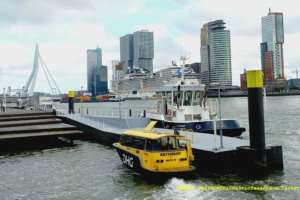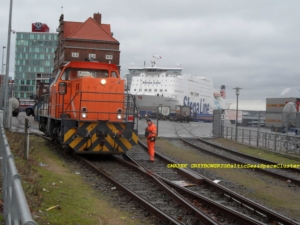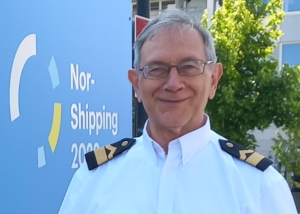Methanol in the port. IAPH has developed a set of safety procedures


 By Marek Grzybowski
By Marek Grzybowski
Methanol is becoming a potentially alternative bunker fuel in maritime transport. It is a carbon neutral fuel. The scale of its use has been increasing since 2015 due to the growing order portfolio for ships using dual-fuel engines that can use green fuel. The number of ships using methanol will increase rapidly in the coming decade, predicts IAPH (International Association of Ports and Harbors).
A special team of engineers and experts was established for this purpose. The IAPH Working Group on Clean Marine Fuels is tasked with suggesting to shipowners “the widest possible spectrum of alternative fuels to improve air quality and reduce greenhouse gas emissions in and around ports and harbors.”
IAPH is a non-governmental organization (NGO) based in Tokyo, founded in 1955. It was established on the initiative of approximately 100 global port authorities during a meeting in Los Angeles. During almost 70 years of operation, it has transformed into a global alliance, currently representing 177 ports and 147 enterprises related to this industry in 84 countries. Collectively, member ports handle more than 60% of global maritime trade and handle more than 60% of global container transport. To support ports and shipowners introducing alternative fuels, the IAPH Working Group on Clean Marine Fuels has developed a series of checklists for the bunkering of green fuels, including methanol.

Methanol bunkering procedures
This summer The IAPH Working Group on Clean Marine Fuels has completed work on developing safety procedures for the bunkering of methanol and other alcohol-based fuels as marine fuel. Practitioners have developed seven procedures with safe bunkering checklists for various ship refueling scenarios. Procedures for refueling in the STS system and from a tanker have been developed. The Working Group is chaired by Peter Alkema from the Port of Amsterdam and its security work is coordinated by Cees Boon, Senior Advisor for Security at the Port of Rotterdam. Both are supported by experts from member ports.
“Many experts have been working together for over a decade, starting with the development of IAPH liquefied gas bunkering checklists for ships with LNG systems,” explains the IAPH release and emphasizes that “the expertise gained in liquefied gas bunkering was used to create checklists for the safe bunkering of new alternative fuels such as liquefied biogas (LBG) and liquid hydrogen (LH2).” The procedures were published in November last year on the IAPH World Ports Sustainability Portal.
“Our working group focused primarily on the safety aspects of bunkering new fuels, as our goal is to accelerate the transition to clean marine fuels to decarbonize and improve air quality,” says its manager Peter Alkema about the Group’s activities. He noted that the purpose of the port engineers “is to enable ports to facilitate, stimulate and regulate the supply of new clean marine fuels by providing expertise and guidance for safe and efficient bunkering operations.” The working group’s focus on creating harmonized methanol bunkering checklists makes sense. For this fuel, the bunkering procedures developed reflect the additional port requirements for the conduct of the related operation in port or in the roadstead.
Security audit methodologies for port authorities
The IAPH Working Group on Clean Marine Fuels is also working on audit methodologies. The aim of this activity is to support port authorities in carrying out their control functions. They will also receive tools to assess both operators performing bunkering from tanker to ship and from bunker to ship. A tool was also developed to check the technical readiness of the terminal to perform LNG bunkering operations. It is emphasized that “The Group also used its expertise for the current WPCAP (World Ports Climate Action Program) initiative aimed at developing a comprehensive tool regarding the level of port readiness for bunkering alternative fuels for ships PRL-AFS (Port Readiness Level for Alternative Fuels for Ships) ).
The Port of Rotterdam Authority emphasizes that “In addition to helping 12 member ports decarbonize, the Global Port Climate Action Program (WPCAP) has contributed to the faster adoption of sustainability standards and measures in the shipping industry.” This was the main conclusion of the fourth meeting of CEOs and members of the WPCAP working group, which was established five years ago to accelerate action to fight climate change in the maritime sector.
– At the time, we believed it was unfair that the shipping industry did not take part in the Paris Climate Agreement, and to solve this problem, we jointly founded WPCAP. Today, the issue of climate change is at the center of attention for both industry leaders and other stakeholders, which is why I am proud of the initiatives we have implemented in recent years. I believe they have helped accelerate the transformation of the entire industry and are a testament to our collective efforts, said Allard Castelein, CEO of the Port of Rotterdam, after the January WPCAP meeting.
Energy transformation in shipping and ports
– These tools are becoming an important element of the emerging energy transformation in shipping. The safe bunkering of fuels in ports is a prerequisite and the excellent work of this social working group helps keep pace with industry requirements for port and ship security as new fuels are introduced, said Patrick Verhoeven, Managing Director of IAPH
We have mastered the procedures for bunkering LNG from road tankers on land in Polish ports in Gdynia and Gdańsk. It is worth taking a closer look at how procedures work for STS processes and in the land-ship process in the case of other alternative fuels. The knowledge of experts forming the IAPH Working Group on Clean Fuels is intended to shorten the implementation time of procedures in ports. The commencement of this procedure will be a signal regarding the readiness to accept them by Polish ports and, therefore, the safe handling of each ship with this innovative fuel installation.
